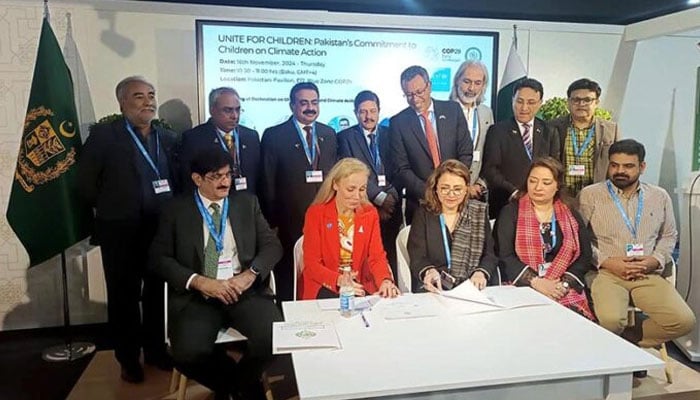Pakistan launches much-anticipated carbon market policy to drive green investment
Pakistan is ready to collaborate with private sector and international partners to develop carbon markets, says Romina
KARACHI: Pakistan has unveiled a comprehensive framework to operationalise carbon markets, signalling its commitment to global climate action and sustainable development.
The country’s newly finalised carbon market policy, presented at a high-level event ‘Launch of Pakistan’s Carbon market Policy & Panel on Coordinated Access to Net Zero Development Financing Through Paris-Aligned Carbon Markets’ held at the Pakistan Pavilion on the sidelines of COP29 global climate conference in Baku on Wednesday, is expected to receive cabinet approval next month. The policy outlines a regulatory framework designed to attract green investment and accelerate its transition to a low-carbon economy.
Coordinator to the Prime Minister on Climate Change Romina Khurshid Alam stressed on Pakistan’s readiness to lead and innovate, adding that the country is ready to collaborate with the private sector and international partners to develop carbon markets that attract green investments. She said that the initiative aligns with Pakistan’s commitments under the Paris Agreement.
Highlighting the significance of partnerships, Alam invited local and international collaborators to co-develop carbon markets in Pakistan.
This collaborative ethos is reflected in Pakistan’s engagement with regional and global initiatives. For example, Ahya’s Tawazan Marketplace, led by CEO Salaal Hasan, is a game-changer in connecting carbon projects in the Middle East and North Africa to international buyers. Projects like Pakistan’s Delta Blue Carbon initiative, already purchased by Microsoft, demonstrate the potential of regional markets to drive both sustainability and economic growth.
The launch of the policy also calls for the government to be prepared for all the related risks. When asked amount the main risks that investors may face in a country like Pakistan that is battling with severe challenges on the climate front, Hasan said: “carbon markets have risk rating mechanisms which accompany standards. Voluntary carbon markets have standards set by private sector bodies such as Verra, Gold Standard or Puro Earth. And risk ratings such as Calyx Global, BeZero or Sylvera. Right now, most of these standards are the US or EU’s. The Middle East and Pakistan need to develop their own standard setting bodies and risk rating agencies.”
He explained that when Pakistani projects are developed, these standards and ratings always rate Pakistan low due to social political and economic factors. “The other risks come from brokers and middlemen, which cause fragmentation and charge hefty upfront costs without transparency. The last is foreign exchange, here carbon registries play a pivotal role in ensuring that investment come into the country and not go out,” Hasan said.
Carbon credits allow carbon emitters to carry on with their activities without worrying about the environmental impact as their investments in eco-friendly ventures will help offset the emissions produced. Carbon-removal credits are produced through schemes like tree plantation or forest protection that could otherwise be destroyed for development activities.
During the launch event, Secretary of the Ministry of Climate Change Aisha Humera Moriani highlighted the extensive work behind the framework: “This policy reflects two years of rigorous effort to align with international standards. It sets the stage for voluntary and compliance markets while ensuring robust monitoring, verification, and reporting protocols.”Pakistan plans to establish a carbon market working group, a national registry, and a monitoring, reporting, and verification (MRV) system. The policy also includes capacity-building programmes for stakeholders and sectoral guidelines to ensure projects meet global compliance and drive real, measurable climate benefits.
-
 Shocking Details Emerge In Martin Short’s Daughter Katherine's Death Investigation: 'Kept To Herself'
Shocking Details Emerge In Martin Short’s Daughter Katherine's Death Investigation: 'Kept To Herself' -
 Yerin Ha On Stepping Into The Spotlight In Bridgerton Season Four
Yerin Ha On Stepping Into The Spotlight In Bridgerton Season Four -
 Nakiska Ski Area Avalanche Leaves Youth Unresponsive, Second Skier Escapes Unhurt
Nakiska Ski Area Avalanche Leaves Youth Unresponsive, Second Skier Escapes Unhurt -
 Igor Komarov Missing In Bali: Seven Foreign Suspects Arrested In Kidnapping Probe
Igor Komarov Missing In Bali: Seven Foreign Suspects Arrested In Kidnapping Probe -
 'I Swear' Director Kirk Jones Says Bafta Broadcast Mishap Failed Tourette’s Advocate
'I Swear' Director Kirk Jones Says Bafta Broadcast Mishap Failed Tourette’s Advocate -
 Yogurt Shop Murders Solved: 1991 Austin Cold Case Finally Linked To Serial Killer
Yogurt Shop Murders Solved: 1991 Austin Cold Case Finally Linked To Serial Killer -
 Iran Tensions Rise As Trump Says He Is 'not Thrilled' With Nuclear Negotiations
Iran Tensions Rise As Trump Says He Is 'not Thrilled' With Nuclear Negotiations -
 Where Is Calvin Klein's Wife Kelly Klein Now After Divorce And Fashion Fame?
Where Is Calvin Klein's Wife Kelly Klein Now After Divorce And Fashion Fame? -
 Kourtney Kardashian’s Role As Stepmother Questioned
Kourtney Kardashian’s Role As Stepmother Questioned -
 Neil Sedaka Dies At 86 After Hospitalisation In Los Angeles
Neil Sedaka Dies At 86 After Hospitalisation In Los Angeles -
 'Lizzie McGuire' Star Robert Carradine's Reason Of Death Laid Bare
'Lizzie McGuire' Star Robert Carradine's Reason Of Death Laid Bare -
 Lisa Rinna Breaks Silence After Recent Reunion With Andy Cohen: 'I've Pissed Him Off'
Lisa Rinna Breaks Silence After Recent Reunion With Andy Cohen: 'I've Pissed Him Off' -
 Savannah Guthrie Mom Update: Unexpected Visitors Spark Mystery Outside Nancy's Home
Savannah Guthrie Mom Update: Unexpected Visitors Spark Mystery Outside Nancy's Home -
 Elle Fanning Shares Detail About Upcoming Oscars Night Plan With Surprise Date
Elle Fanning Shares Detail About Upcoming Oscars Night Plan With Surprise Date -
 Demi Lovato Spills Go-to Trick To Beat Social Anxiety At Parties
Demi Lovato Spills Go-to Trick To Beat Social Anxiety At Parties -
 Benny Blanco Looks Back At The Time Selena Gomez Lost Her Handrwritten Vows Days Before Wedding
Benny Blanco Looks Back At The Time Selena Gomez Lost Her Handrwritten Vows Days Before Wedding




